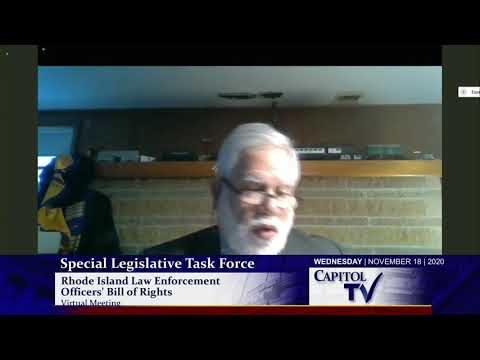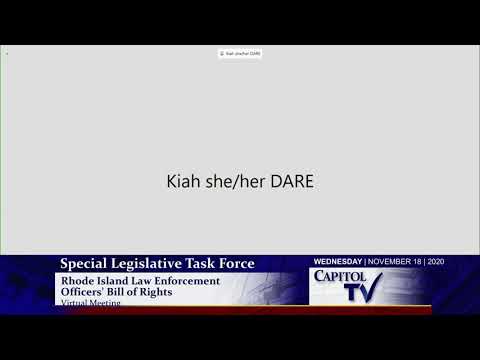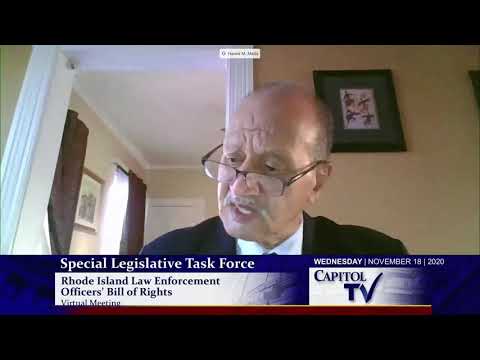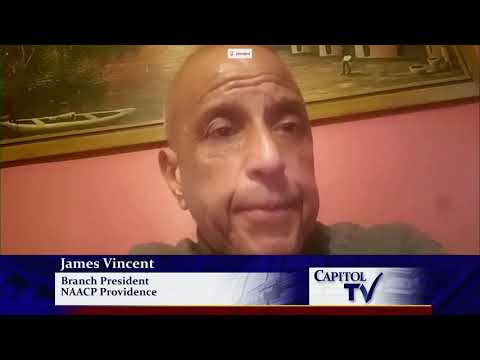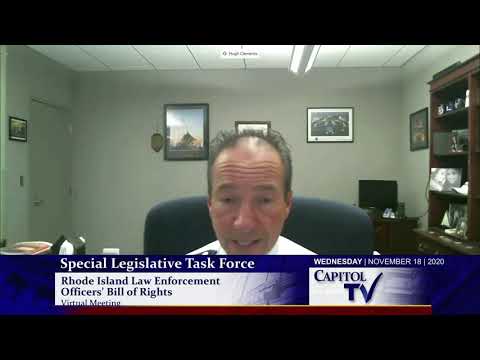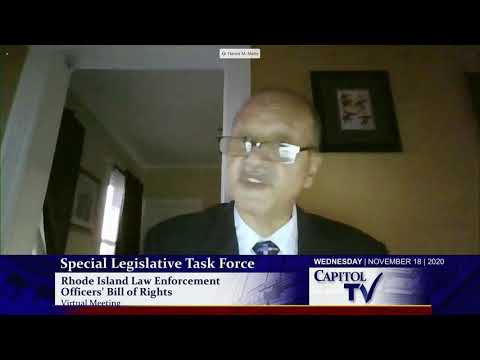Is the Law Enforcement Officer’s Bill of Rights about accountability?
At the most recent meeting of the Senate Task Force to suggest changes to the Law Enforcement Officer’s Bill of Rights, it was suggested that LEOBoR “has nothing to do with accountability…”
November 19, 2020, 6:12 pm
By Steve Ahlquist
The Rhode Island Senate’s “Special Legislative Task Force to Review and Provide Recommendations on Policies Pertaining to the Rhode Island Law Enforcement Officers’ Bill of Rights” (LEOBoR Task Force) held its fifth meeting on Wednesday afternoon, and one of the central questions discussed is whether LEOBoR acts as a shield for police officers facing disciplinary action.
Michael DiLauro, Director of Legislative Initiatives at the Rhode Island Public Defender‘s office provided his testimony via a video that was played for the task force members and the public. There was no opportunity for task force members to pose questions to Director DiLauro.
Director DiLauro was particularly interested in the question of transparency, in particular, the “transparency of records pertaining to allegations of law enforcement officer misconduct.” This kind of material is called “Giglio material,” named after the United States Supreme Court decision Giglio v United States, in which, “the Court held that the prosecution’s failure to inform the jury that a witness had been promised not to be prosecuted in exchange for his testimony was a failure to fulfill the duty to present all material evidence to the jury, and constituted a violation of due process, requiring a new trial.”
The problem with not getting this material in a standardized, uniform and consistent way could be addressed by legislating “statewide policies and procedures that assist law enforcement in determining what and what is not Giglio material,” said Director DiLauro. “Both the United States and the Rhode Island Supreme Courts have consistently stated that Giglio material involving allegations of law enforcement officers misconduct are included in the definition of exculpatory evidence, and disclosure of which is required…”
The idea here is that a police officer’s history of misconduct is an appropriate subject for a defendant to examine, even if the misconduct has nothing to do with the present case. In State of Rhode Island v Beaumier. The Rhode Island Supreme Court overturned the conviction of Raymond Beaumier because it found that an examination of a police officer’s record of misconduct was “relevant cross-examination that should have been permitted because these ongoing allegations [of misconduct] may have caused the officer to shade his testimony or try to curry favor with his superiors.”
In other words, bad cops make for potentially unreliable witnesses, making prosecution of cases more difficult and the convictions less certain.
Kiah Bryant, co-executive director of Direct Action for Rights and Equality (DARE), was the next person to provide testimony to the task force. Director Bryant began by saying that she had spoken to members of DARE from Providence, Pawtucket, Central Falls and Woonsocket, and noted that “all our members are directly impacted by police issues, either directly of indirectly.”
“Most of our members feel the same way, as I do, that LEOBoR is a way for police officers in the State of Rhode Island to legally get away with traumatizing and brutalizing residents, specifically in Providence,” said Director Bryant. LEOBoR “is not a safeguard for us. It is not a way for us to hold police officers accountable for their actions. It’s a ‘Get Out of Jail Free’ card and a paid vacation for them. Police Officers are not held accountable in a way that gives our community hope, that gives our community trust in them…
“We need to feel that police officers can be held accountable,” said Director Bryant. “We want police officers not just to be able to take a paid vacation or paid leave, they need to be fired.”
“Growing up in Providence I’ve seen so many civil rights violations basically happen at the hands of police on Black and brown folks, specifically youth. I’ve seen police officers tear a person’s car apart looking for something to arrest these kids with. I’ve seen police officers beat kids up for nothing, for simply talking back,” continued Director Bryant. “A close and personal friend of mine is currently in a wheelchair because of police officers. Nothing was done. That police officer got a promotion…
“LEOBoR is not helping us at all, and our community is in favor of getting rid of it altogether.”
Director Bryant’s testimony was the entirety of civilian input to the task force.
Director Bryant’s testimony brought an immediate response from task force member Anthony Capezza Jr, who serves as the state director and lobbyist for the International Brotherhood of Police Officers. “Mrs Kiah was referring to LEOBoR,” said Director Capezza, getting Director Bryant’s name wrong, “but everything she was talking about was accountability. I don’t know if she realizes that LEOBor has nothing to do with the accountability. LEOBoR comes into play after the fact – after a complaint’s been made, and an officer has been charged.”
Director Bryant was still on the line, and was able to ask, “Doesn’t LEOBoR have some protections for disciplinary actions for police officers who are under investigation?”
“What happens with LEOBoR,” answered Director Capezza, “It comes into effect after the officer has been charged…”
“Yes, and nothing ends up happening to the police officers,” countered Director Bryant. “It makes it harder for police officers to be fired. They have to be convicted of a felony… investigations get stalled. Nothing happens… Police officers invoke LEOBoR because they know they’re going to be protected by it. They know they’re going to get paid leave and vacations, and they can still do what they want to do.”
Senator Harold Metts (Democrat, District 6, Providence), who chairs the committee, said that he hopes to find common ground and come up with a system that is fair to the public and to police officers. “Our goal is to bring balance to the system,” said Senator Metts, who added that Director Bryant’s testimony was important so that the task force would hear the perspective of the community.
Jake Bissaillon, legal counsel to the Rhode Island Senate Majority Leader, is acting as the clerk for the task force, and he presented the results of a standardized survey sent to all law enforcement agencies in Rhode Island regarding the implementation and use of LEOBoR in their agencies over the last five years. 37 of the 38 law enforcement agencies in Rhode Island responded to the survey. The South Kingstown Police Department declined to participate.
The survey results, though interesting, are hard to interpret based on what was presented on video to the public. Task force members will have access to more information. But what is interesting is that between 2015 and 2020, there were four LEOBoR panels convened, and in each case the officer was found to be in violation.
Providence Police Chief Hugh Clements spoke about the results of the survey, and admitted that the data is confusing. But two things become clear, maintained Chief Clements:
- The major delays in determining proper discipline come in when there are criminal charges brought against an officer. The way the system works now is that LEOBoR proceedings begin after criminal charges have been resolved through the court system.
- LEOBoR is used very sparingly. “I’ve been the chief in Providence for nine years,” said Chief Clements. “In nine years, twice we’ve used LEOBoR. That is not to suggest that we do not impose discipline. In fact, we impose discipline oftentimes. A lot of discipline.”
“In the Providence Police, in the last nine years, there have been 27 times where discipline has been imposed in the form of termination or resignation,” said Chief Clements. “Each one of those 27 could potentially have been a [LEOBoR] hearing. In each one of those 27, the officer was removed prior to a LEOBoR hearing.”
LEOBoR, continued Clements, “continues to be a great tool.”
Senator Metts asked how there can be trust in a system when there is little transparency around the way in which discipline is administered. That questioned went unanswered.
The next meeting will consider a draft report that will contain all the changes the task force will consider recommending to the Senate in creating a bill to reform LEOBoR.


